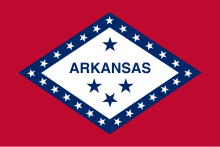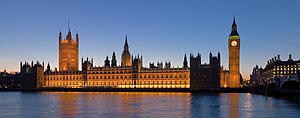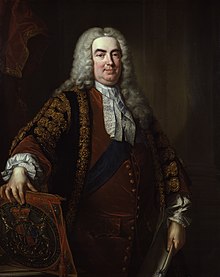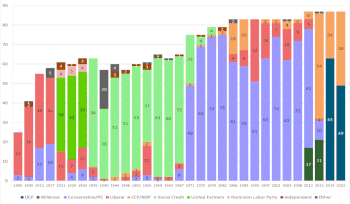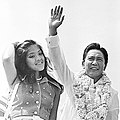| Main | Topics and categories | Tasks and projects |
The Politics portal
Politics (from Ancient Greek πολιτικά (politiká) 'affairs of the cities') is the set of activities that are associated with making decisions in groups, or other forms of power relations among individuals, such as the distribution of status or resources. The branch of social science that studies politics and government is referred to as political science.
Politics may be used positively in the context of a "political solution" which is compromising and non-violent, or descriptively as "the art or science of government", but the word often also carries a negative connotation. The concept has been defined in various ways, and different approaches have fundamentally differing views on whether it should be used extensively or in a limited way, empirically or normatively, and on whether conflict or co-operation is more essential to it.
A variety of methods are deployed in politics, which include promoting one's own political views among people, negotiation with other political subjects, making laws, and exercising internal and external force, including warfare against adversaries. Politics is exercised on a wide range of social levels, from clans and tribes of traditional societies, through modern local governments, companies and institutions up to sovereign states, to the international level.
In modern nation states, people often form political parties to represent their ideas. Members of a party often agree to take the same position on many issues and agree to support the same changes to law and the same leaders. An election is usually a competition between different parties.
A political system is a framework which defines acceptable political methods within a society. The history of political thought can be traced back to early antiquity, with seminal works such as Plato's Republic, Aristotle's Politics, Confucius's political manuscripts and Chanakya's Arthashastra. (Full article...)
Selected article
The Political Cesspool is a weekly talk radio show founded by James Edwards, and syndicated by Liberty News Radio Network and Accent Radio Network. First broadcast in October 2004 twice a week from radio station WMQM, it is broadcast on Saturday nights on WLRM, a Christian radio station in Millington, Tennessee. Its sponsors include the white separatist Council of Conservative Citizens and the Institute for Historical Review, a Holocaust denial group. According to its statement of principles, the show stands for the "Dispossessed Majority" and represents "a philosophy that is pro-White." It has attracted criticism from multiple organizations for its promotion of anti-semitic, white nationalist and white supremacist views. The show features Edwards and his co-hosts Bill Rolen, Winston Smith, Keith Alexander, and Eddie Miller, as well as producer Art Frith. Its guests have included author Jerome Corsi, Minuteman Project leader Jim Gilchrist, former Constitution Party presidential candidate Michael Peroutka, actor Sonny Landham, British National Party leader Nick Griffin, Vermont secessionist Thomas Naylor, and paleoconservative activist Pat Buchanan.
Featured picture

Aletta Jacobs (1854–1929) was a Dutch physician and women's suffrage activist. Jacobs strove throughout her life to change laws that limited women's access to equality, starting in 1883 with an unsuccessful court challenge and eventually achieving success on 18 September 1919, with the signing of a suffrage bill into law. In addition to her suffrage work she led campaigns aimed at deregulating prostitution, improving women's working conditions, and promoting peace.
Selected quote
Selected biography
Ramón Emeterio Betances was a Puerto Rican nationalist. He was the primary instigator of the Grito de Lares revolution and, as such, is considered to be the father of the Puerto Rican independence movement. Betances was also the most renowned medical doctor and surgeon of his time in Puerto Rico, and one of its first social hygienists. He had established a successful surgery and ophthalmology practice. Betances was also a diplomat, public health administrator, poet and novelist. He served as representative and contact for Cuba and the Dominican Republic in Paris. A firm believer in Freemasonry, his political and social activism was deeply influenced by the group's philosophical beliefs. His personal and professional relationships (as well as the organizational structure behind the Grito de Lares, an event that, in theory, clashes with traditional Freemason beliefs) were based upon his relationships with Freemasons, their hierarchical structure, rites and signs.
Did you know (auto-generated) -

- ... that in his first month in the job, Wali Mohammad Itoo suspended all 23 opposition representatives when they questioned his integrity as the speaker of the Jammu and Kashmir Legislative Assembly?
- ... that Babydog is "a fixture in West Virginia politics"?
- ... that red-boxing by American politicians is used to coordinate with Super PACs, an activity that the Campaign Legal Center called the "primary mechanism for corruption of federal campaigns in 2022"?
- ... that Romanian adventure novelist N. D. Popescu-Popnedea "generate[d] laughter" with his deposition at a political assassin's trial?
- ... that before becoming the mayor of Medan, Indonesia, Agus Salim Rangkuti acted in movies and oversaw a real-life political prison camp?
- ... that in addition to having been a centre for local involvement in Chinese politics, the Kuomintang Building in Vancouver has hosted social events including a wedding reception?
More did you know...
- ...that in the 1930s, Australia was home to a paramilitary Fascist organization called the New Guard?
- ...that Nazi scientists claimed to have trained a dog to call "Adolf Hitler" as "Mein Führer"?
- ...that for many years, the Russian Soviet Republic did not have its Communist Party?
- ...that the World War II idea of Polish-Czechoslovakian confederation was eventually discarded by the Czechs, whose leader chose instead to believe in the Soviet Union promises of alliance?
- ...that co-founder of the Saudi Civil and Political Rights Association Mohammed al-Bejadi spent most of 2011 in prison?
- ...that tiao-kuai is the quasi-federal administration system in China?
In this month
- December 7, 2003 – the Conservative Party of Canada is formed.
- December 13, 2000 – The U.S. Supreme Court stops the Florida presidential recount, effectively giving the state, and the Presidency, to George W. Bush.
- December 6, 2005 – David Cameron becomes the 26th Leader of the British Conservative Party
- December 15, 2005 – Parliamentary elections are held in Iraq.
- December 17, 2005 – Evo Morales wins the presidential elections in Bolivia, ousting incumbent Eduardo Rodriguez and becoming the country's first indigenous leader.
- December 18, 1834 – Sir Robert Peel publishes the Tamworth Manifesto which lays the foundation for the modern British Conservative Party.
- December 30, 2006 – Former Iraqi dictator, Saddam Hussein is hanged.
News and Current events
- August 11: 4 local government areas in New South Wales, Australia locked down after COVID-19 case
- August 11: Australia: AstraZeneca vaccine access expanded by Victorian government
- August 1: Australia: Victorian lockdown lifted
- July 29: Tunisia's president dismisses prime minister, suspends parliament
- July 25: Australia: Wikinews interviews Reg Kidd, mayor of the City of Orange, about COVID-19 lockdown and local government
- July 23: South Australia enters week-long lockdown to contain COVID-19 Delta variant spread
- July 21: Technological University Dublin senior lecturer Dr Lorcan Sirr speaks to Wikinews on housing market in Ireland
- July 21: Three rural councils in New South Wales, Australia enter 7-day lockdown
- July 21: Australia: Victoria lockdown extended by a week with 85 active cases recorded
- July 15: California governor signs new state budget, eligible Californians to get stimulus payments
Topics and categories
General images
Related portals
Associated Wikimedia
The following Wikimedia Foundation sister projects provide more on this subject:
-
Commons
Free media repository -
Wikibooks
Free textbooks and manuals -
Wikidata
Free knowledge base -
Wikinews
Free-content news -
Wikiquote
Collection of quotations -
Wikisource
Free-content library -
Wikiversity
Free learning tools -
Wiktionary
Dictionary and thesaurus
![Image 1 2024 BJP CM History The Bharatiya Janata Party (BJP) is one of the two major parties in the political system of the Republic of India, the other being the Indian National Congress (INC). As of 2015[update], it is the country's largest political party in terms of representation in the national parliament. Established in 1980, the BJP's platform is generally considered as the right-wing of the political spectrum. As of 13 June 2024[update], 54 BJP leaders have held the position of a chief minister out of which thirteen are incumbent. A chief minister is the head of government of each of the twenty-eight states and two union territories (UTs) (Delhi and Puducherry). According to the Constitution of India, at the state-level, the governor is de jure head, but de facto executive authority rests with the chief minister. Following elections to the state legislative assembly, the governor usually invites the party (or coalition) with a majority of seats to form the government. The governor appoints the chief minister, whose council of ministers are collectively responsible to the assembly. The chief minister's term is usually for a maximum of five years, with the confidence of the assembly's confidence. There are no limits to the number of terms the chief minister can serve. (Full article...)](http://up.wiki.x.io/wikipedia/en/d/d2/Blank.png)






